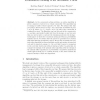Free Online Productivity Tools
i2Speak
i2Symbol
i2OCR
iTex2Img
iWeb2Print
iWeb2Shot
i2Type
iPdf2Split
iPdf2Merge
i2Bopomofo
i2Arabic
i2Style
i2Image
i2PDF
iLatex2Rtf
Sci2ools
119
click to vote
SAGA
2009
Springer
2009
Springer
Economical Caching with Stochastic Prices
In the economical caching problem, an online algorithm is given a sequence of prices for a certain commodity. The algorithm has to manage a buffer of fixed capacity over time. We assume that time proceeds in discrete steps. In step i, the commodity is available at price ci ∈ [α, β], where β > α ≥ 0 and ci ∈ N. One unit of the commodity is consumed per step. The algorithm can buy this unit at the current price ci, can take a previously bought unit from the storage, or can buy more than one unit at price ci and put the remaining units into the storage. In this paper, we study the economical caching problem in a probabilistic analysis, that is, we assume that the prices are generated by a random walk with reflecting boundaries α and β. We are able to identify the optimal online algorithm in this probabilistic model and analyze its expected cost and its expected savings, i.e., the cost that it saves in comparison to the cost that would arise without having a buffer. In p...
Related Content
| Added | 27 May 2010 |
| Updated | 27 May 2010 |
| Type | Conference |
| Year | 2009 |
| Where | SAGA |
| Authors | Matthias Englert, Berthold Vöcking, Melanie Winkler |
Comments (0)

